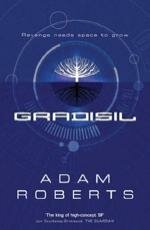

Gradisil by Adam Roberts
Reviewed by Paul Bateman
Gollancz, London, 2006, 458pp, £18.99, h/b, ISBN 0-575-07587-2
In the future, governments have given up on space and the bohemian rich having taken up the challenge, building homes in the upper atmosphere free from the constraints of gravity and law. Gradisil follows three generations of Uplanders in the creation of a new kind of country. In the first part of Adam Roberts' new novel, one of the first bohemian inhabitants of the Uplands, Klara, recounts her adolescent affairs in the Uplands, the brutal murder of her pioneering father at the hands of the world's most wanted psychopath, and her revenge. The second part concerns Klara's illegitimate daughter, Gradisil, named after Yggradisil, a tree of Norse myth, and a symbol of the lines of electromagnetic force that the Uplanders ride into space. Her loyal yet cuckolded husband, Paul, tells the story of her rise and fall as the first President of the Uplands and the first US-Uplands war. The third part concludes the novel with Gradisil's two sons, Sol and Hope.
In this novel, Adam Roberts has played to his greatest strength shown in much of his previous work, such as Salt and Polystom: the examination of human folly against a background of conflict and war, how an individual's misunderstandings and prejudices and pride can shape world events, taking in strands of extended plots concerning murder, rape, betrayal and revenge. There are points where he seems to be commenting on America's War on Terror and the Iraq War, although oddly Islam isn't heavily featured and China is more or less ignored. He knows people are fallible, illogical; stupidity and greed often triumph, and he isn't afraid to show us how far. This could be his best book yet. Better still, unlike some of his previous works, he doesn't appear to be paying homage to other authors. The ideas are original, and like in his previous works, the concepts stick in the mind, in this case the possibility of living in low Earth orbit as a distinct community and even a country in its own right. He has thrown off the shackles of acknowledged influence to generate his own voice, to become an author others will try to imitate in future and plunder his ideas. His parodies, like The Sodditt and Sellamillion, help pay the bills, save him from the impending pensions crisis and possibly satiate his lust for imitation, but the serious works will be what he will be remembered for.
But Gradisil probably won't be his classic. As good as it is, it hints at something better on the horizon. This successive generational structuring didn't make for a fulfilling novel. The first act peters out as Klara has little impact on the next part, while the Gradisil section doesn't conclude satisfactorily and the final part reads like an over extended epilogue. The second part contains the major plot of the book and possibly should have been the focus of the novel and would have been a more enjoyable story in itself if the other two parts hadn't been there. If necessary, the first act could have been woven in and out the book as flashbacks and back-story. The characters for the third act should have been developed more in the second act so that the third act could have been shorter and had more impact. Maybe this is more conventional method of structuring a book, but it's one that might have made the end result seem complete rather than three vaguely related tales pressed together to make up a word count.
Another gripe is that each act is linguistically stylised to emphasize change over the years, for example, in the second section ships 'dok' rather than 'dock', but I wasn't convinced these differences were extreme enough. This is something very difficult to pull off and Roberts doesn't manage it to the brilliant standard that Tricia Sullivan set with Maul and David Mitchell furthered with Cloud Atlas. His approach is too subtle, too conservative, too conventional. This is particularly noticeable as much of the book is told in the first person and a bit more flare with language would have given each of the narrators more character, more of a distinct voice, rather than being different shades of Adam Roberts.
In the final analysis, Gradisil is a good book, with a number of interesting concepts and fully fleshed characters, but it's not a great book. The plot doesn't follow a compelling line from start to finish. Some books don't need this. They can be in distinct, unrelated sections but the overall effect can be greater than the sum of its part. Gradisil doesn't manage that. But then again would a better book have given me the delights of 'poodle-hoops'?
This article first appeared in Vector 248. Back issues of Vector are available from
